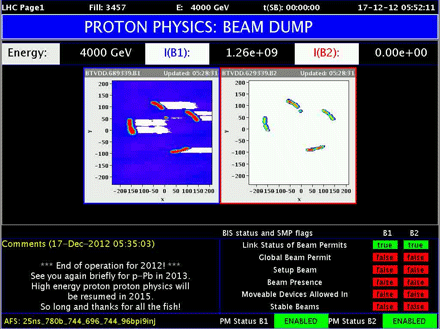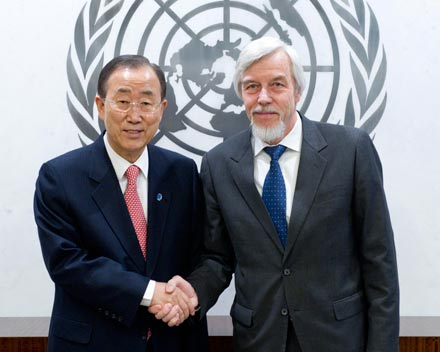LHC proton run ends with new milestone

The final beam of the three-year proton run at the
LHC is dumped, with the phrase "So long and thanks for all the fish"
from the control team (Image: CERN)
This morning CERN teams brought the first proton run at the Large Hadron Collider
to and end with the message "So long and thanks for all the fish," - a
phrase made famous by British writer Douglas Adams in his Hitchhiker's Guide to the Galaxy
series. The remarkable first three-year run of the world's most
powerful particle accelerator was crowned by a new performance
milestone. The space between proton bunches in the beams was halved to
further increase beam intensity and the accelerator's luminosity."This new achievement augurs well for the next LHC run starting in 2015," says CERN's head of accelerators and technology, Steve Myers. "High-intensity beams are vital for the success of the LHC programme. More intense beams mean more collisions and a better chance of observing rare phenomena."
Of the 6 million billion proton-proton collisions generated by the LHC, the ATLAS and CMS experiments have each recorded around 5 billion collisions of interest over the last three years. Of these, only around 400 produced signatures compatible with the Higgs-like particle whose discovery was announced in July.
Read more
CERN DG meets with Ban Ki-moon

United Nations Secretary-General Ban Ki-moon (left) and CERN Director-General Rolf Heuer (Image: Evan Schneider/UN)
On 17 December CERN's Director-General, Rolf Heuer, met with Ban
Ki-moon, Secretary-General of the United Nations (UN). Their meeting
follows CERN's accession to status of observer at the United Nations General Assembly
on 14 December. The two leaders discussed CERN's new status and how the
laboratory can contribute to the Assembly's work. Rolf Heuer pledged
that CERN was willing to actively contribute to the UN's efforts to
promote science. In particular, CERN can help with the 'Science for sustainable development' initiative coordinated by UNESCO, and with objectives of the post-2015 agenda.CERN, founded under the auspices of UNESCO, maintains strong relations with several UN institutions. CERN and UNESCO, for example, lead knowledge dissemination projects in developing countries. CERN's accession to observer status to the UN General Assembly strengthens these efforts to share scientific knowledge across nations.

No comments:
Post a Comment